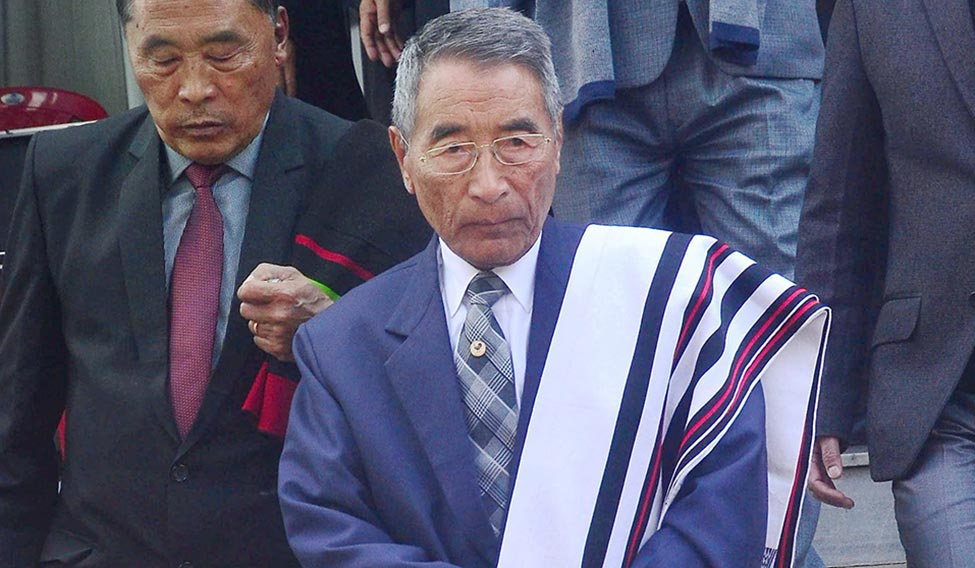Shurhozelie Liezietsu, 80, took oath as the chief minister of Nagaland on February 22, three days after his predecessor, T.R. Zeliang, was forced to step down amid protests by tribal organisations against the state government’s decision to reserve 33 per cent seats in urban local bodies for women.
In his first extensive and exclusive interview since taking charge, Liezietsu told THE WEEK that his government was not in conflict with the National Socialist Council of Nagaland (Isak-Muivah), the insurgent group that runs a parallel government in Hebron, a small region deep in the Naga jungle. Dominated by Baptist Christians, Hebron is the headquarters of the NSCN(IM). THE WEEK’s exclusive cover story on the secret Naga state (‘Bullets and the Bible’, April 23) had caught the attention of authorities, including the Nagaland government.
Liezietsu said he wanted an “early political solution” to the insurgency. He opened up about a host of issues, including the status of the framework peace accord signed by the Union government and the NSCN(IM) in 2015, and how the state government, led by the Naga People’s Front (NPF, of which he is chairman), was trying to reach out to all underground groups.
How committed is the Nagaland government to bringing about an “early solution” to the problem?
It has been the avowed stand of the NPF-led DAN [Democratic Alliance of Nagaland] government that the protracted Naga political problem should be resolved without further delay, since it has been hampering the development of the state. We have had enough bloodshed and violence. It is our sincere endeavour that the problem be resolved in our lifetime and not be handed down to the younger generation. We want posterity to march ahead with the rest of the world as proud equals.
The people are getting impatient, as hopes had risen with the signing of the framework agreement in 2015.
We have fully supported the framework agreement signed between the Government of India and the NSCN(IM) on August 3, 2015. But this does not mean we support only one Naga political group. Any settlement should be inclusive, since it is an undeniable fact that the Nagas have been fragmented into several groups. All these groups should be on board before any settlement is arrived at, [and] if we are to bring about a permanent and acceptable resolution to the Naga political problem.
My government has recently constituted a ‘political affairs mission’ and it shall be our endeavour to reach out to all underground groups and appeal to them for unity and understanding. My message to the Naga people at this juncture would be to have a positive mind and to reciprocate the bold and determined moves of the Government of India to solve the problem once and for all.

The NSCN(IM) has been running a parallel government for many years. How is the state government dealing with this unique situation?
I won’t say that the NSCN(IM) is running a parallel government in Nagaland, because the state government is the legal and constitutionally accepted government. The NSCN(IM) is a political entity which has been recognised by the Government of India. Talks are being held at the highest level; that is, at the prime minister’s level.
It is good that the NSCN(IM) has entered into a framework agreement. But, what about the Khaplang faction of the NSCN and other groups that claim to represent the Nagas? They are not happy with the government holding talks with the NSCN(IM) alone.
Ever since the NSCN(K) abrogated the ceasefire with the Government of India, it has been the continued stand of my party and the government led by my party that it should reenter into ceasefire with the government and hold talks. We do not subscribe to violence of any sort and we do not believe that armed confrontation can bring about any solution.
We have sent several emissaries to Myanmar, with the knowledge of the Government of India, to ask Khaplang and his leaders to shun violence and come forward for resolution of any misunderstanding with the government. The political affairs mission is also tasked to approach NSCN(K) leaders to change their stance and heed the voice of the people.
People are paying taxes to NSCN outfits. Would you call it an act of extortion?
Voluntary contributions to underground outfits is not something new to the Naga people since the movement for self determination started as a people’s movement. There was a time when villagers even went to the extent of gathering volunteers to join the underground movement, and make arrangements for their monthly or yearly rations.
But, over the decades, with the fragmentation of the Naga people into various groups, there have been increasing incidences of ‘demands’ on the public by the groups. These are treated as extortion. Strict vigil is kept and stern actions are taken against extortionists. Thanks to mass protests and growing awareness among the people, I should say the problem has largely been contained.
NSCN(K) has joined forces with other insurgent outfits like United Liberation Front of Asom and National Democratic Front of Bodoland. How do you intend to bring about peace in such a hostile situation?
We do not believe in violence in any form. Our endeavour is to persuade the NSCN(K) to renew the ceasefire agreement with the Government of India.
Do you think the demand of certain Naga outfits for sovereignty is justified? Will shared sovereignty be acceptable to Nagaland if such a solution is worked out?
Times have changed and so have political realities. We must appreciate and recognise the stand of the Government of India. We must be practical. Today, political sovereignty has been eclipsed by economic sovereignty. We must accept these realities. Shared sovereignty, or whatever arrangement that can be mutually beneficial and acceptable to the Government of India and the Naga people, should be worked out without further delay.








